
[ad_1]

Louise Vincent has used road medicine since she was 13. She has emerged as a number one voice making an attempt to humanize and assist individuals who use medicine as they face essentially the most devastating overdose disaster in U.S. historical past.
April Laissle/NPR
disguise caption
toggle caption
April Laissle/NPR

Louise Vincent has used road medicine since she was 13. She has emerged as a number one voice making an attempt to humanize and assist individuals who use medicine as they face essentially the most devastating overdose disaster in U.S. historical past.
April Laissle/NPR
When Louise Vincent was launched at a drug coverage convention final month in Phoenix, the enormous crowd erupted in applause.
She’s a small girl, rail skinny. At age 47, her face is weathered by what she describes as a tough life.
It’s grown more durable lately, after drug cartels started pushing deadlier medicine into U.S. communities, together with fentanyl and the veterinary drug xylazine.
“We saw the drug supply turn upside down,” Vincent instructed the gang. “It’s toxic.”
In interviews with NPR, Vincent mentioned she herself started utilizing medicine at age 13 and has by no means been capable of dwell sober long-term. “What they told me was if I couldn’t get [off drugs], I wasn’t doing something right, and that’s not true,” she mentioned.
Vincent factors to analysis exhibiting that abstinence-focused approaches to recovery don’t work for many people who expertise habit.
Her personal concepts are controversial and face severe opposition from many U.S. politicians. Many Democrats and Republicans need harder legal guidelines and longer jail sentences to fight fentanyl.
But Vincent has emerged as one of many main voices within the U.S. pushing to humanize and rally assist for drug customers, like herself, even once they’re not but keen or capable of dwell sober.
“We have made it OK to abandon people who use drugs. We tell an entire group of people it’s OK if they die,” she mentioned.
With complete drug deaths within the U.S. now topping 112,000 fatalities a yr, she argues the U.S. concentrate on regulation enforcement and drug abstinence hasn’t labored and it is time to strive one thing new.
“We’ve had the real push for abstinence for how many years now?” Vincent mentioned. “And where have we gotten?”
A philosophy of “harm reduction” born on the streets
Vincent’s personal habit began early in North Carolina. From the beginning, she mentioned folks instructed her she was worthless, a junkie, a prison and a zombie.
“I felt like I didn’t belong anywhere,” she mentioned. “It’s devastating.”
According to Vincent, this type of stigma, rejection and isolation deepens the cycle of habit and self-destructive habits that leaves folks like herself weak.
The unlawful drug provide has solely gotten extra harmful since Vincent started utilizing. A couple of years in the past, earlier than public well being warnings had been issued in regards to the risks of xylazine being combined into fentanyl, Vincent used a dose of the chemical cocktail.
It left her with wounds that also have not healed. “It has eaten the skin off my entire arm,” she mentioned. “I can’t even talk about it without crying.”
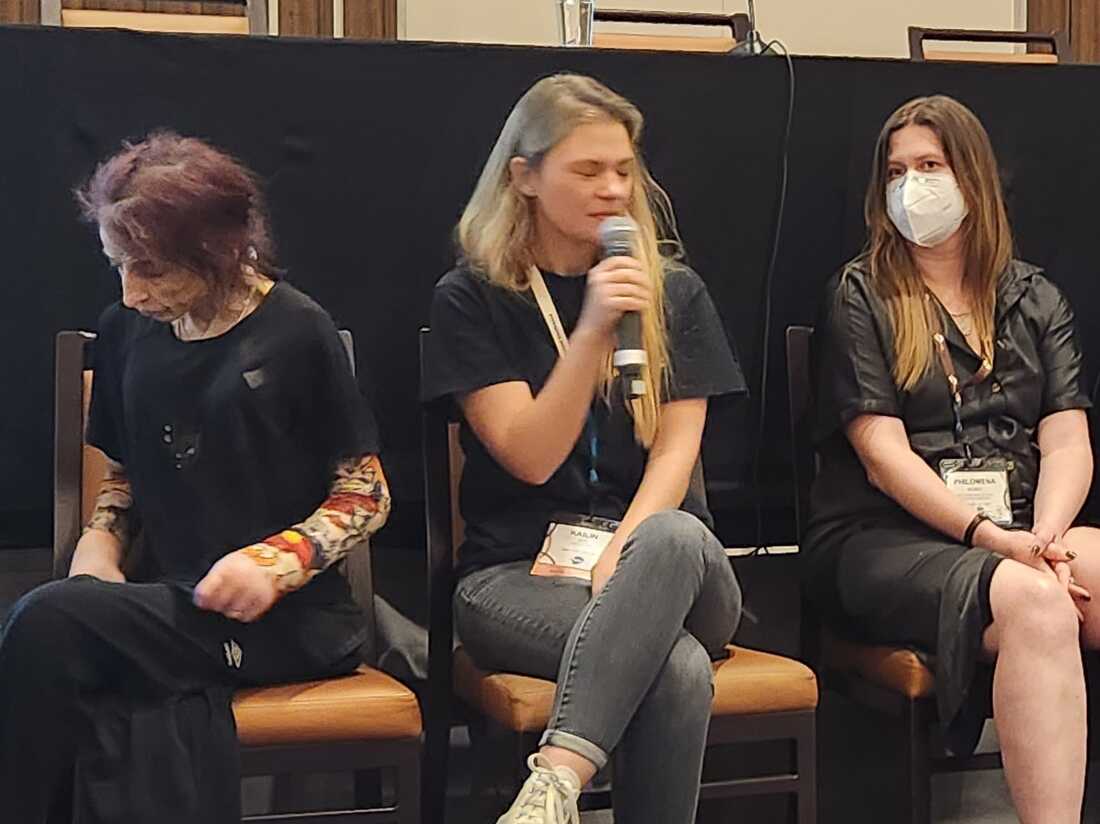
Louise Vincent (left) actively makes use of medicine reminiscent of fentanyl. She wears particular sleeves to cowl wounds attributable to her unintentional publicity to xylazine, a harmful chemical that drug sellers combined into her fentanyl.
Brian Mann/NPR
disguise caption
toggle caption
Brian Mann/NPR

Louise Vincent (left) actively makes use of medicine reminiscent of fentanyl. She wears particular sleeves to cowl wounds attributable to her unintentional publicity to xylazine, a harmful chemical that drug sellers combined into her fentanyl.
Brian Mann/NPR
This half is difficult for a lot of Americans to know. If drug use is so dangerous, why do not considerate folks like Louise Vincent merely cease?
Research exhibits habit would not work like that.
It’s advanced, arduous to beat, twisted up in all the pieces from psychological sickness and trauma to poverty and homelessness.
Federal researchers say roughly 27.2 million Americans expertise some form of drug habit. Roughly 5 million to six million folks within the U.S. misuse opioids yearly.
Opioids like fentanyl and heroin are particularly troublesome to flee. Relapses are widespread.
Most consultants agree the U.S. has did not create the form of well being care system wanted to assist extra folks get better.
Vincent’s argument — laid out at conferences and public appearances — is that the U.S. must reinvent habit care by treating drug customers with dignity, serving to them keep away from the worst outcomes.
The habit methods Vincent helps embody:
- giving drug customers primary healthcare and entry to wash needles and different provides which are confirmed to cut back illness reminiscent of HIV-AIDS and Hepatitis C
- making medical therapies for opioid habit, like methadone and buprenorphine, much more accessible and inexpensive
- when road drug use threatens to disrupt neighborhoods, responding with inexpensive housing, counseling and different helps, no more arrests.
“Let me just say, I didn’t start doing harm reduction because I wanted to save the world,” she mentioned. “I wanted to save myself. I need a family. I didn’t want to feel rejected anymore.”
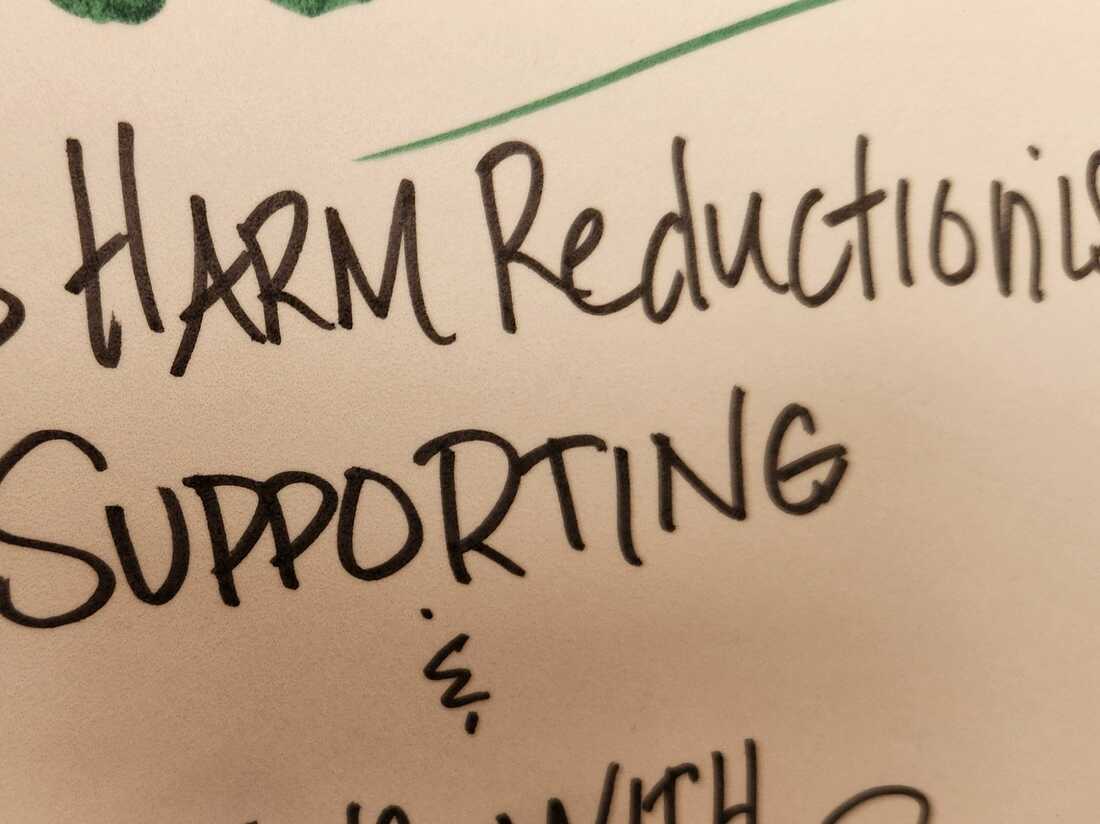
Harm discount advocates say most of the 27 million Americans who use unlawful road medicine yearly aren’t capable of obtain sobriety. They need the U.S. to embrace packages that assist folks use medicine extra safely.
Brian Mann/NPR
disguise caption
toggle caption
Brian Mann/NPR

Harm discount advocates say most of the 27 million Americans who use unlawful road medicine yearly aren’t capable of obtain sobriety. They need the U.S. to embrace packages that assist folks use medicine extra safely.
Brian Mann/NPR
Bringing drug customers out of the shadows
Vincent was one of many first activists within the U.S. to place many of those concepts into apply, providing lively drug customers providers and care out within the open.
She created the Urban Survivors Union, an area in downtown Greensboro, N.C. Drug customers who come right here haven’t got to cover their habit. They can get a meal or a cup of espresso.
“It was a total mess, and we have worked really hard to turn it into a cozy, warm place,” she mentioned, whereas giving NPR a tour of the ability.
Staff can be found to information folks towards social service packages or therapy. There’s tools out there to check road medicine for high-risk chemical compounds reminiscent of fentanyl and xylazine.
“We’re creating a wound room for xylazine wounds that people are coming in with,” Vincent mentioned.
She compares this grassroots effort — humanizing and bringing drug customers into the open — to the struggle for LGBTQ acceptance in the course of the Nineties. The stigma and demise surrounding habit in the course of the fentanyl disaster, she says, mirror the early years of the HIV-AIDs epidemic.
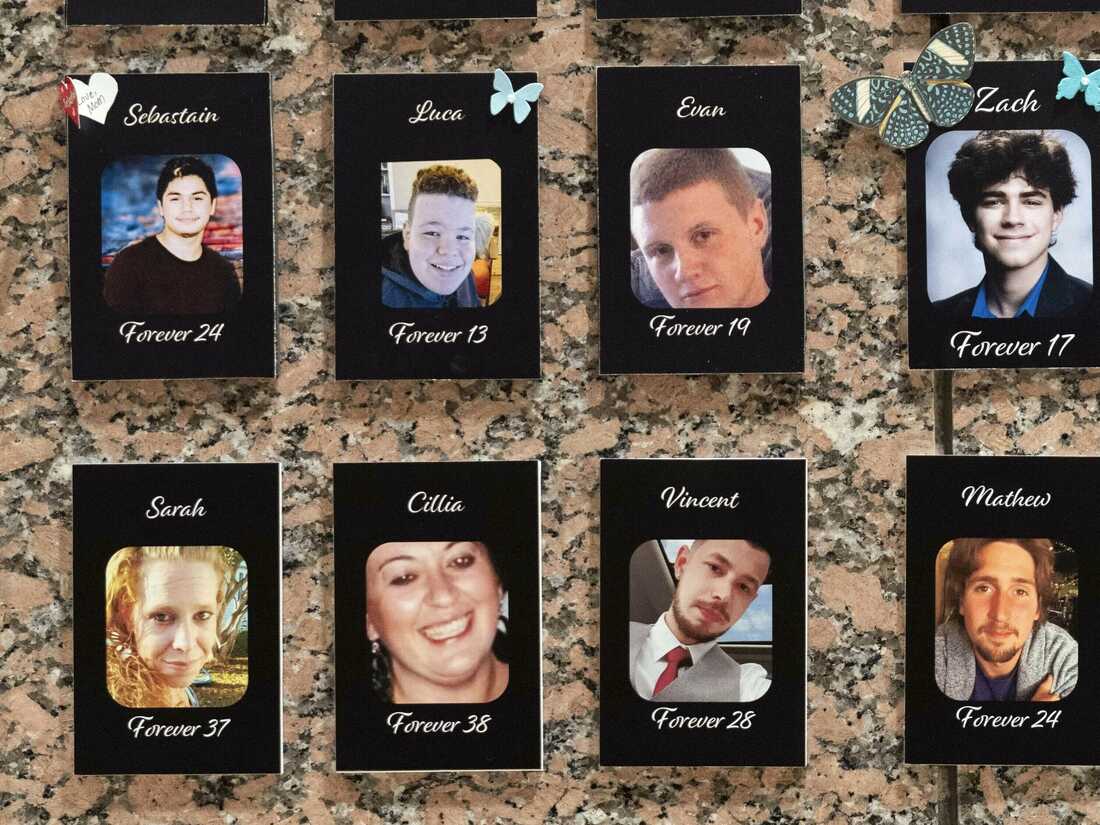
Photographs of people that had died from medicine are on show in the course of the Second Annual Family Summit on Fentanyl at DEA Headquarters in Washington, Tuesday, Sept. 26, 2023. (AP Photo/Jose Luis Magana)
Jose Luis Magana/AP
disguise caption
toggle caption
Jose Luis Magana/AP
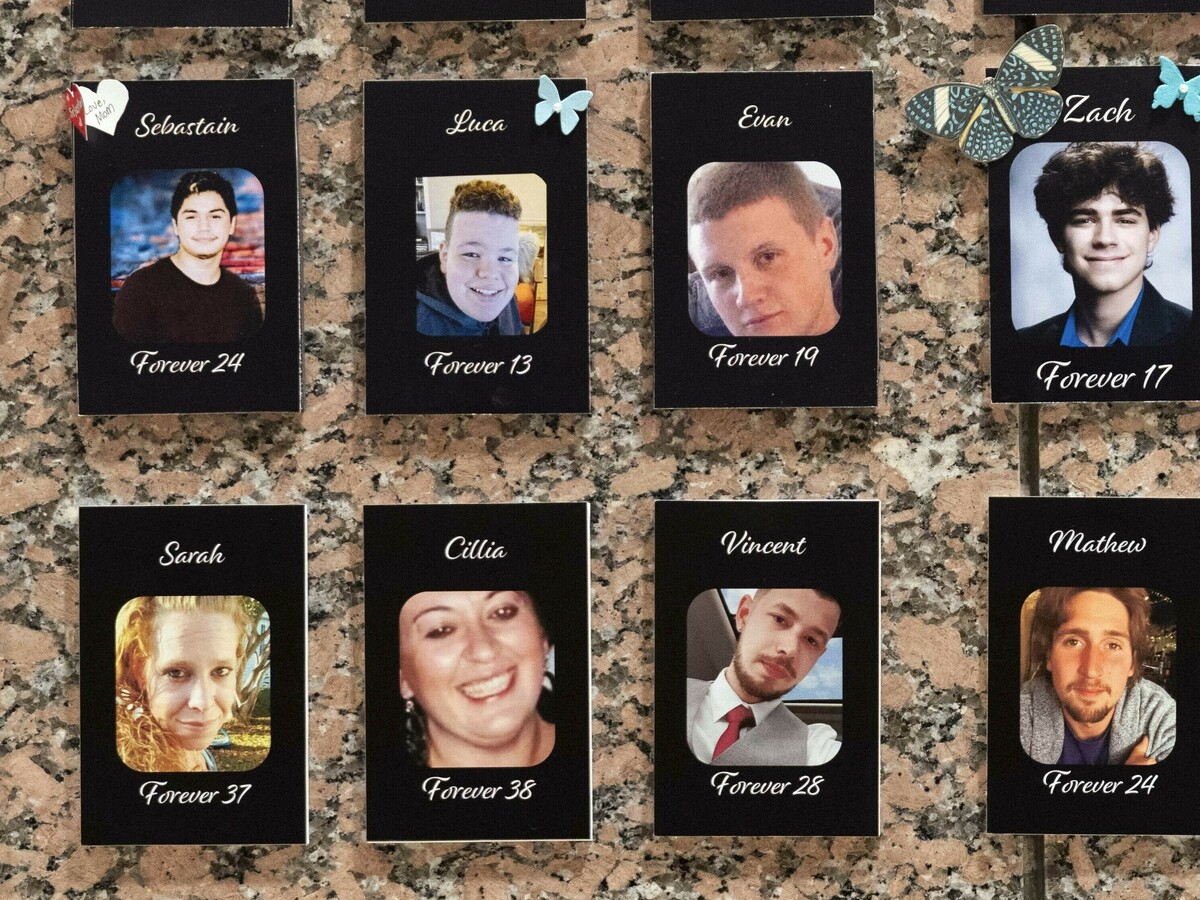
Photographs of people that had died from medicine are on show in the course of the Second Annual Family Summit on Fentanyl at DEA Headquarters in Washington, Tuesday, Sept. 26, 2023. (AP Photo/Jose Luis Magana)
Jose Luis Magana/AP
“We’ve had an entire community swept away. I can’t even think of all the people I know who’ve died,” she mentioned.
“I mean so many people have died. My daughter died. Our mentors are dead. I can barely stand to be here sometimes because of all the trauma and all the people that we’ve lost.”
Many drug coverage consultants in authorities, academia and habit therapy — together with the American Medical Association and the American Society of Addiction Medicine — have come to share Vincent’s perception that the present U.S. method to the drug disaster has failed.
The AMA and ASAM have endorsed the thought of offering protected drug consumption websites as a technique to cut back deadly overdoses, as Canada, Portugal and different nations have completed, however thus far solely two such websites function overtly within the U.S., each in New York City.
“It’s so dangerous right now, and there are some answers and some things that work that we just downright refuse to implement,” Vincent mentioned.
A “harm reduction” backlash as public anger over drug use grows
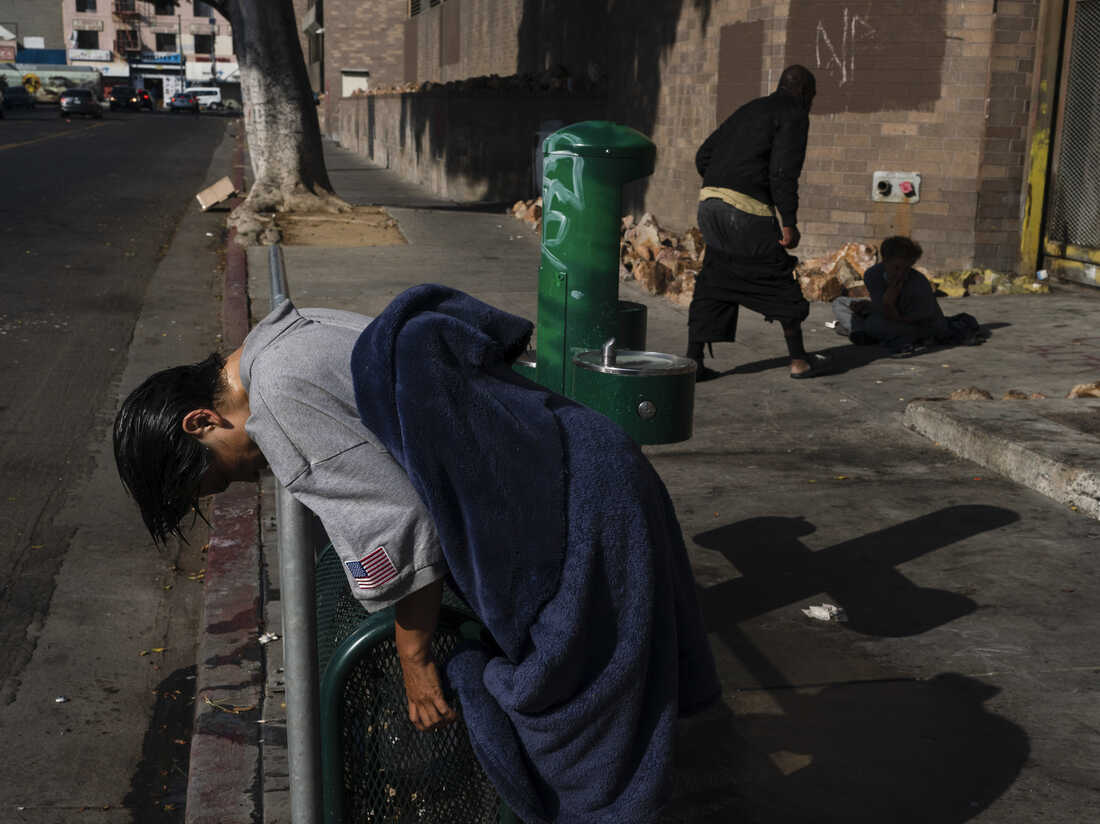
A mentally ailing homeless girl experiencing habit leans on a rail after wetting her hair at a ingesting fountain within the Skid Row space of Los Angeles, Monday, May 23, 2022. (AP Photo/Jae C. Hong)
Jae C. Hong/AP
disguise caption
toggle caption
Jae C. Hong/AP
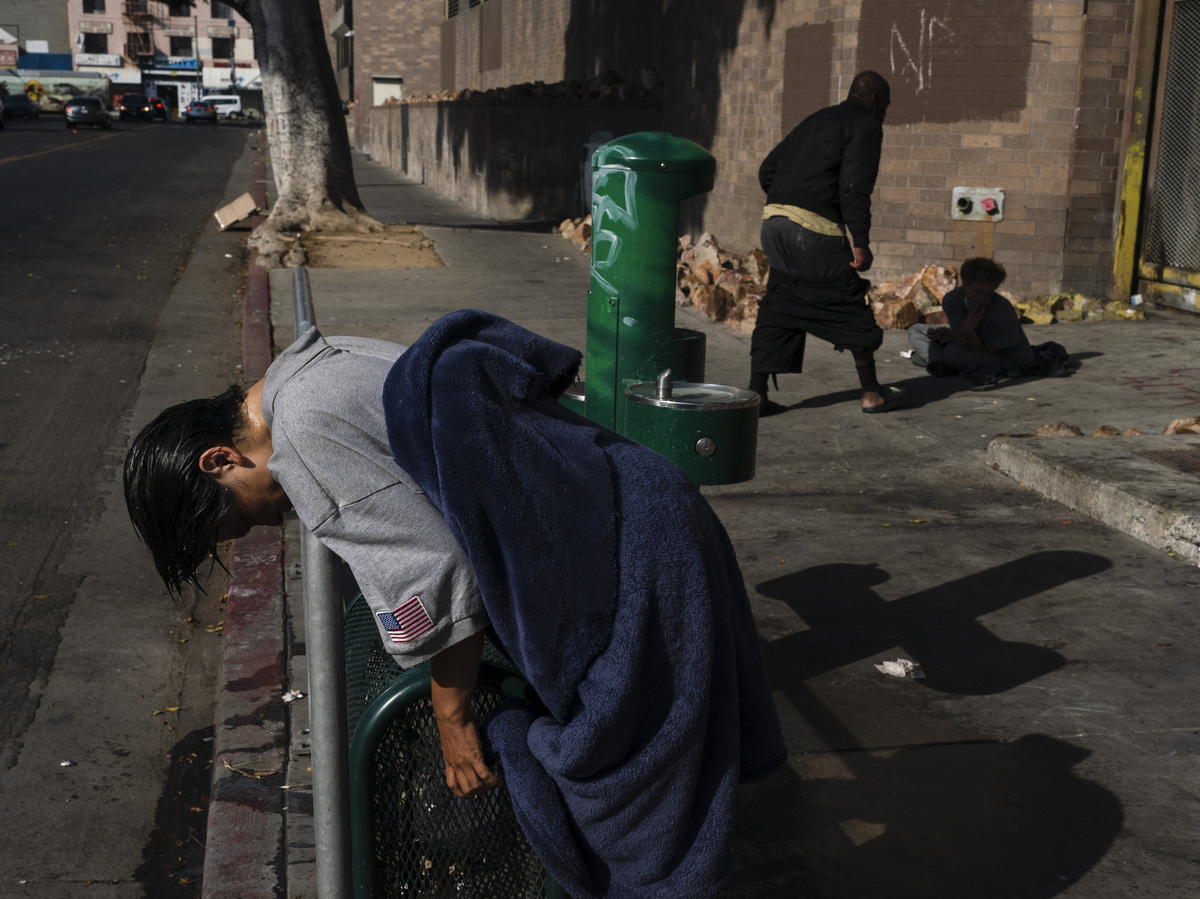
A mentally ailing homeless girl experiencing habit leans on a rail after wetting her hair at a ingesting fountain within the Skid Row space of Los Angeles, Monday, May 23, 2022. (AP Photo/Jae C. Hong)
Jae C. Hong/AP
Many politicians are shifting in the other way. Responding to homeless camps and open-air drug markets, some Democrats and Republicans have backed harder drug legal guidelines for fentanyl like these handed in the course of the crack cocaine epidemic.
Vincent fears this backlash will drive extra folks like herself underground, making them much more weak to overdose.
“They are now saying arrest, arrest, arrest, arrest,” she mentioned. “Nobody is going to talk about their drug use that’s not already out.”
Vincent says she’ll hold combating for the concept that drug customers across the U.S. deserve acceptance and locations, like her drug-users union, the place they will go to really feel welcome and protected.
“I think it’s everything. We built this and we did it underground when it was illegal,” she mentioned. “I’ll do it illegally again. I believe that people who use drugs deserve to be treated with dignity and respect.”
But with fentanyl deaths nonetheless rising and lots of politicians promising a fair harder response, Vincent acknowledges that her imaginative and prescient of drug customers gaining acceptance and care within the U.S. nonetheless feels a good distance off.
April Laissle, host and reporter at NPR member station WFDD in North Carolina, contributed reporting to this story
[adinserter block=”4″]
[ad_2]
Source link